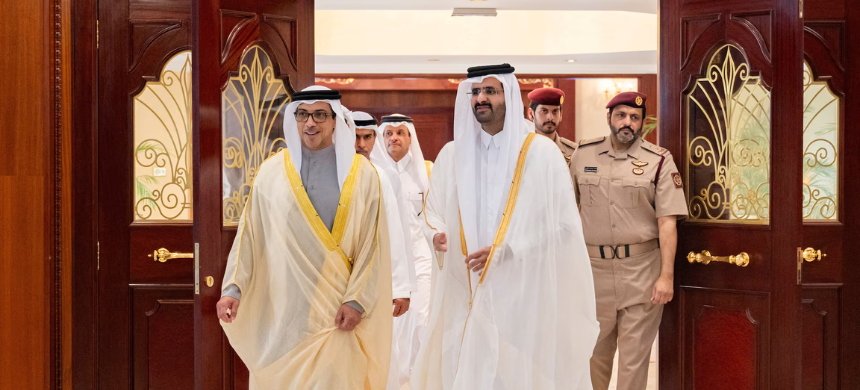The coincidental timing of an emergency meeting of Gulf foreign ministers in Doha, alongside a visit from Iranian President Masoud Pezeshkian for talks with Qatar’s emir, raises important questions about how Gulf states will respond if Israel intensifies its military actions with the aim of not just weakening Iran, but fundamentally reordering the Middle East.
The Sunni coalition of six Gulf monarchs has historically been distrustful of Iran and its Shia proxies, having labeled Hezbollah as a terrorist organization in 2016. However, they also oppose further escalation by Israel, believing that only Washington has the leverage to restrain Israeli Prime Minister Benjamin Netanyahu. The Gulf states maintain that establishing an independent Palestinian state is crucial for regional stability and prosperity. Saudi Foreign Minister Prince Faisal bin Farhan emphasized this in a recent Financial Times article, highlighting that “Palestinian statehood is a prerequisite for peace,” while notably omitting any reference to the Israeli-Iran conflict or the likelihood of U.S. intervention as President Joe Biden approaches the end of his term and an upcoming election.
Despite the popular support in Gulf states for the Palestinian cause, their leaders are unlikely to deviate from their long-standing strategy of limiting support to humanitarian aid and political backing for the Palestinians. Instead, they confront the prospect of an assertive Israel intent on breaking the deadlock in Gaza by targeting Hezbollah’s military leadership and rendering Iran incapable of retaliating.
Reports of Israel potentially targeting Iranian oil installations and nuclear sites are particularly alarming to the Gulf Cooperation Council (GCC). One Arab diplomat expressed concern over the moral ramifications of a complete Israeli victory, fearing it would reinforce the notion that “justice” can be achieved through total warfare.
The GCC, chaired by Qatari Prime Minister Sheikh Mohammed bin Abdulrahman bin Jassim Al Thani, argues for a ceasefire between Hamas and Israel as the solution to the ongoing crisis. However, Israel’s recent killing of Ismail Haniyeh, a key figure in Hamas, has dealt a significant blow to Doha’s hopes for mediation.
On another front in Lebanon, the GCC states—including Kuwait, Oman, Saudi Arabia, Qatar, and the UAE—have called for Israel to respect Lebanon’s sovereignty and accept a ceasefire, though none have endorsed Iran’s actions against Israel.
Should Israel’s resurgence continue, Gulf and Arab states may find themselves in a dilemma. A long-term weakening of Iranian influence could create an unwanted power vacuum, where Israel’s dominance prevails. Conversely, it might provide regional states with an opportunity to counter Iranian-backed non-state actors.
Many regional leaders have reasons to see Tehran diminished. A weakened Iran could enable Iraq’s president, Mohammed Shia al-Sudani, to exert control over Iranian-backed factions, while Syria’s Bashar al-Assad, who has remained silent amid the conflict, might regain influence in Lebanon.
Read More: Netanyahu Warns Iran of Consequences: ‘Big Mistake, and They Will Pay’
Jordan is particularly concerned about the Islamic Action Front, an offshoot of the Muslim Brotherhood, which recently emerged as the largest party in parliamentary elections. Jordan has also blamed Iran for attempting to incite hostility against it.
Bahrain, having normalized relations with Israel in 2020 along with the UAE, is confronted with ongoing pro-Palestinian demonstrations. Pro-Iran LuaLua TV has reported Shia demonstrations mourning the death of Hezbollah leader Hassan Nasrallah.
This ongoing tit-for-tat between Israel, Iran, and its proxies promises further violence and devastation. Kuwait is engaged in a long-term contest with Iran over gas extraction from a disputed offshore natural gas field.
However, the pivotal relationship remains that between Iran and Saudi Arabia, which improved following a de-escalation roadmap agreed upon in 2023. Saudi Arabia hosted the Iranian president for the first time in over a decade and permitted Iranian pilgrims to visit the holy sites in Mecca and Medina. Riyadh has also re-established ties with Iran-backed Syria and seeks Iranian support to deter Houthi attacks from Yemen.
Saudi leaders have repeatedly emphasized their disinterest in normalizing relations with Israel without a credible two-state solution. Netanyahu’s recent call for Saudi Arabia to follow the UAE in normalizing relations failed to acknowledge this position or the obstacles posed by his administration.
In a recent paper from the European Council on Foreign Relations, the authors stress that the Saudi-Iranian relationship is vital for maintaining peace, asserting that a zero-sum strategy aimed at excluding Tehran from the regional security framework will lack regional backing and ultimately prove counterproductive.











